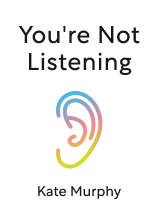

This article is an excerpt from the Shortform book guide to "You're Not Listening" by Kate Murphy. Shortform has the world's best summaries and analyses of books you should be reading.
Like this article? Sign up for a free trial here.
Do you ever check out in the middle of a conversation? How good are you at reading body language?
In You’re Not Listening, Kate Murphy argues that listening skills are disappearing throughout society. She asserts that this has a disastrous impact because effective listening forms the foundation of healthy relationships, personal growth, and social cooperation.
Read more to learn how to improve your listening skills with Murphy’s recommendations.
How to Improve Your Listening Skills
Murphy says that, fortunately, you can overcome the barriers standing in the way of understanding others and become a more effective listener. We’ve grouped Murphy’s advice on how to improve your listening skills into three main categories: Stay curious, respond well, and pay close attention to the person speaking.
Tip #1: Stay Curious About the Person You’re Listening To
To start listening more effectively, Murphy argues you should prioritize being curious about the other person. Focus on the things you don’t know about the speaker and the possibilities for learning. She provides two strategies for fostering curiosity: Make room for the unexpected and notice your own thoughts and feelings.
1) Make Room for the Unexpected
Murphy argues that when a listener assumes they already know where a conversation is going, this undermines their curiosity. By staying open to the possibility of an unpredictable or surprising conversation, a listener can stay curious about the person speaking.
| The Two Types of Curiosity Not all types of curiosity are going to help you be an effective listener. Psychologists have distinguished two types of curiosity, only one of which is helpful. 1. Negative curiosity is born out of the need to reduce uncertainty. This arises in situations where an important piece of information is missing: For example, not knowing whether your symptoms are the result of a serious disease. Negative curiosity feels uncomfortable and is alleviated by the discovery of new information. 2. Positive curiosity is intrinsically motivated and born out of the enjoyment of discovering new things. For example, you may decide to spend an afternoon watching documentaries about cuttlefish. This type of curiosity is stimulated, rather than alleviated, by new information. In other words, the more you learn, the more curious you become. Positive curiosity will help you become a better listener because it is inexhaustible. You can cultivate positive curiosity while listening to others by focusing on your intrinsic desire to learn about people. |
2) Notice Your Own Thoughts and Feelings
Furthermore, Murphy recommends that you notice your own thoughts and feelings while listening to someone. For example, you may feel under attack if someone’s views contradict yours. This could lead you to react with anger or disgust instead of curiosity. By paying attention to yourself, you can notice these emotional responses and choose to stay curious.
(Shortform note: You can pay attention to yourself more effectively by understanding your emotional triggers. Psychologists assert that people have “buttons” that trigger emotional responses that are disproportionate to the scenario. These are often the result of past traumas—reservoirs of intense emotion that can be triggered in ordinary situations. Some psychologists recommend that you begin by identifying your triggers. When was the last time you reacted strongly to something someone said? Is there anything in your past that may have shaped this response?)
Tip #2: Respond in Ways That Encourage Sharing
Murphy states that you can become a more effective listener through your responses to the person speaking. Specifically, she recommends finding responses that encourage the speaker to continue sharing. In this section, we’ll explore nonverbal and verbal responses that can encourage a speaker to share.
1) Nonverbal Responses That Encourage Sharing
To start, Murphy recommends that you adjust your nonverbal communication to show you are listening. Maintaining strong eye contact and a relaxed posture comes across as inviting and encourages sharing.
Also, allow for pauses in the conversation instead of speaking as soon as the other person stops. This gives the other person time to get their whole thought across—which is important because people often don’t say exactly what they mean on their first try. Additionally, encountering a pause often prompts a speaker to elaborate on their point, sharing details they may not have shared otherwise.
2) Verbal Responses That Encourage Sharing
Murphy identifies two types of responses that encourage sharing: open-ended questions, and assisting responses.
Open-ended questions allow the speaker to direct the conversation—in contrast to closed-ended questions that steer the conversation in a particular direction. By asking open-ended questions, you can encourage the other person to speak freely about whatever they want.
Assisting responses encourage and help the speaker in sharing. We assist someone in sharing when we ask questions that encourage them to elaborate on what’s most important to them. Murphy contrasts this with a redirecting response, which steers the conversation away from what they’re trying to share.
Tip #3: Pay Close Attention to the Speaker
You can also become a more effective listener by paying close attention to the person speaking. Murphy states that you’ll notice much more about what they’re communicating. Speakers reveal a lot through nonverbal communication and word choice. By paying attention to more than their words, you can learn how the speaker is feeling and why they want to share something.
| How to Read Body Language Body language experts extend Murphy’s advice with specific clues to look for in a person’s body language to better understand their feelings and intentions. In What Every Body Is Saying, Joe Navarro recommends paying close attention to a person’s feet. People often point their feet away from situations that make them uncomfortable. If someone points their feet toward you during a conversation, this could signal their comfort with you. However, if one foot is pointed toward the door, this could indicate a readiness to leave. That said, Navarro cautions you against inferring too much about the body posture of someone you just met. He recommends observing someone first to understand their “baseline”—or default—body language. Once you know what’s normal for someone, you’ll be better equipped to spot deviations from their baseline that reveal the most about their emotional state. |
Optimize Your Attention: Resist Distractions
To pay close attention, Murphy stresses the importance of resisting distractions. If you’re mainly distracted by external things, you can alter your environment to minimize the potential for distractions. For example, if you know your phone will be a distraction, you can turn it off. If you’re mainly distracted by internal things, such as boredom, you’ll have to be aware of this tendency and choose to pay attention to the speaker.
Murphy suggests that when you do get distracted, you should ask the other person to repeat themselves. While it may feel uncomfortable to admit you became distracted, the repetition ensures that you understand them more than if you just guess what they said based on context.
(Shortform note: It’s a good idea to start strengthening your ability to resist distractions now because researchers have found that this ability may get weaker with age. This happens because focusing requires two separate neurological systems. One system pays attention to the task. The other system suppresses and ignores irrelevant stimuli. People have a harder time focusing as they age because the system for ignoring and repressing irrelevant stimuli becomes weaker. You can counteract this by reducing distracting stimuli, such as decluttering your home.)
Tip #4: Be Aware of Your Limitations
Lastly, Murphy recommends that listening effectively requires you to understand your limitations and emotional capacity. Attention is a finite resource, and paying close attention to someone drains people too much to do it all the time. Your life will also involve time-sensitive obligations that may be more important at the moment than listening.
If you try to listen when you don’t have the time or emotional energy to listen, you won’t listen effectively. The other person will notice this and won’t feel understood, and neither of you will feel connected. Instead of trying to simply power through your limits, you should set boundaries for yourself by giving yourself permission to postpone or altogether avoid listening when necessary.
(Shortform note: In maintaining your emotional capacity, many psychologists recommend making a regular practice of checking in with your emotions. They argue that you don’t suddenly exhaust yourself all at once, but that you deplete your emotional energy gradually. Therefore, by regularly checking in with your emotions, you can recognize when you’re running low on energy and give yourself short breaks before hitting a wall.)
Exercise: Develop Your Effective Listening Skills
This exercise provides a chance to develop your effective listening skills using Murphy’s strategies and advice.
- Think of a time when you wish you’d listened more effectively. Which obstacle do you think was getting in the way and why? Recall that the main obstacles are: distractions, discomfort, a self-focused culture, and making assumptions.
- Murphy states that we often fail to listen effectively to family, friends, and loved ones because we presume that we’ve nothing new to learn from them. Who is someone in your life you’d like to listen to more effectively? What can you do the next time you talk to them to listen more effectively?
- Murphy explains that technological distractions prevent people from listening effectively. How could you limit your technology distractions the next time you have a conversation with someone?
- Murphy provides three major pieces of advice for improving listening skills: staying curious about the person you’re talking to, responding in ways that encourage sharing, and paying closer attention. Which of these pieces of advice could benefit you the most right now and why?

———End of Preview———
Like what you just read? Read the rest of the world's best book summary and analysis of Kate Murphy's "You're Not Listening" at Shortform.
Here's what you'll find in our full You're Not Listening summary:
- A look at how listening skills are disappearing throughout society
- How to become a better, more effective listener
- Why it's easier to listen to strangers than to those close to you






